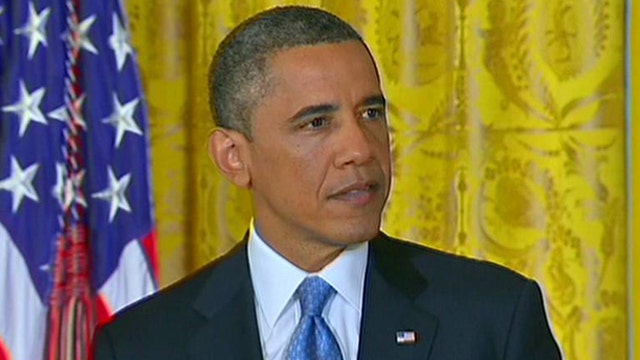Obama: Full faith, credit of USA not a 'bargaining chip'
President holds final news conference of first term
President Obama on Monday warned congressional Republicans again that he will not negotiate over the debt ceiling, saying Washington must increase the limit to pay its bills and that such brinksmanship would be “absurd” and “irresponsible.”
“The issue here is whether Washington will pay its bills,” Obama said in the final press conference of his first term. “We are not a deadbeat nation.”
The president’s comments opened the roughly 30-minute White House question-and-answer session with reporters that focused largely on the debt ceiling and Obama’s gun-control plans in the aftermath of last month’s mass shooting at an elementary school in Newtown, Conn., in which 26 were killed.
Obama, who vowed following the Dec. 14 massacre to curb gun violence, repeated his promise.
“If there is a step we can take that will save even one child from what happened in Newtown, we should take that step,” said the president, who is expected to get strong opposition from gun rights groups should he submit legislation to Congress, as expected.
Obama also suggested such groups are publicizing what appears to be strong turnouts at gun shows as “an effective way of ginning up fear on the part of gun owners that somehow the federal government is about to take all of your guns.”
Andrew Arulanandam, a National Rifle Association spokesman said, “The president should go talk to the people buying firearms and ask them why they're buying firearms."
Obama also said some of his proposed changes will require legislation and some of them can be accomplished through executive action.
The president used the press conference to attempt to frame the debt limit issue to the American public as one about the perils of not paying past debts – not about future spending.
“Raising the debt ceiling does not authorize more spending,” he said. “These are bills that have already been racked up.”
Republicans leaders responded by saying the debit limit debate is connected to spending, suggesting another round of intense negotiations when Congress returns later this month.
"The American people do not support raising the debt ceiling without reducing government spending at the same time,” said House Speaker John Boehner. “The House will do its job and pass responsible legislation that controls spending, meets our nation's obligations and keeps the government running, and we will insist that the Democratic majority in Washington do the same."
Boehner's remarks were in sharp contrast to those of Obama, who said near the start of the press conference that he won re-election on his plan, which separates the debt ceiling from talks about reducing the U.S. deficit through spending cuts and increasing tax revenue through closing loopholes.
Obama argued he has already reduced federal spending by $1.2 trillion over the past two years but remains willing to talk about more cuts, including some to Medicare.
Still, the president acknowledged the Republican-controlled House likely has enough votes to demand spending cuts be part of the debate, which would result in no increase to the debt limit and the county defaulting on its bills.
The House nearly did that in summer 2011.
The chamber returns to negotiate with the Democrat-controlled Senate and the White House on three fiscal matters with looming deadlines: the debt ceiling, massive federal spending cuts known as sequester and a budget resolution.
The talks resume because Washington again failed after the November elections to reach a long-term solution to the country’s debt and deficit issues.
Senate Republican Leader Mitch McConnell said Obama and his allies need to get serious about spending and that the debt limit debate is “the perfect time for it.”
The Kentucky senator also called the county’s debt and deficit a “huge, huge problem."
On a question about Obama nominating only men to his Cabinet for his second term, the president told critics to wait until his selections are complete “before they rush to justice.”





















